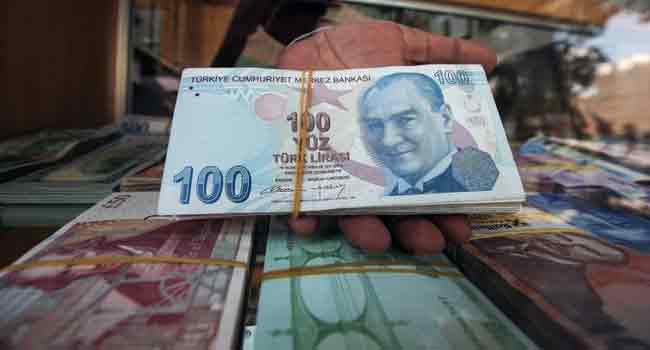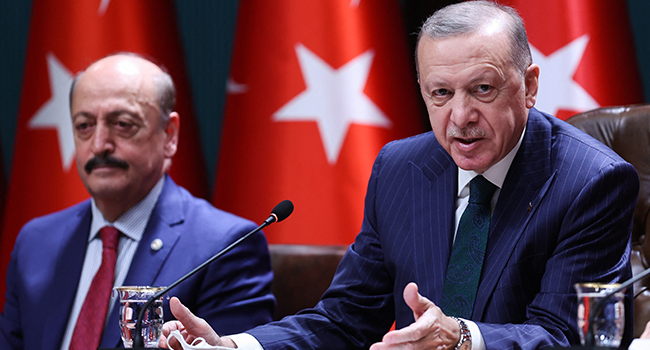
Asian and European markets tumbled and the Turkish lira dived almost eight percent Monday on fears that the economic crisis gripping Turkey could spill over into the global economy.
With investors already on edge over the China-US trade war, the lira’s collapse sparked a sell-off in Europe and New York at the end of last week, with safe-haven assets including the Japanese yen and Swiss franc rallying.
The lira dived to a record low of 7.24 to the dollar at one point overnight before recovering slightly after the country’s finance minister said Ankara was planning to roll out an “action plan” on Monday in response to the crisis.
That was followed by the central bank saying it was ready to take “all necessary measures” to ensure financial stability, easing reserve requirements for lenders and promising to provide them with liquidity.
“Our institutions will take necessary action from Monday in order to relieve the markets,” Berat Albayrak said, adding that the plan would center on “the state of our banks and the small and medium-sized enterprises” most affected by the lira’s plunge.
The lira has been hammered this year, having started January at around 3.70 to the dollar according to Bloomberg data, while it is also sharply down against the euro.
However, the European unit was taking a hit against the greenback on worries about the possible impact on some European banks, including Spain’s BBVA, Italy’s UniCredit and France’s BNP Paribas.
Despite the tumult, President Tayyip Erdogan remains in a combative mood, calling the rout a “political, underhand plot” against Turkey.
The crisis has been sparked by a series of issues including a faltering economy — the central bank has defied market calls for rate hikes — and tensions with the United States, which has hit Turkey with sanctions over its detention of an American pastor.
Ankara has also hit out at Washington’s cooperation with Syrian Kurdish militia in the fight against Islamic State.
Vulnerabilities
“The decline in the lira is multifaceted, caused not only by a weak external position in terms of current account deficit and inadequate currency reserves but also the challenging political environment which exacerbates the vulnerabilities in the lira,” said Kerry Craig, global market strategist at JP Morgan Asset Management.
“A mid-meeting rate hike and tightening of monetary policy may help to avert the lira’s decline, to some extent.”
As well as the lira, emerging market and other high-yielding currencies tumbled across the board.
The Russian ruble, already under pressure after the US hit Moscow with sanctions last week, lost two percent, while the South African rand was battered seven percent.
South Korea’s won and the Australian dollar retreated 0.4 percent and the Indonesian rupiah lost 0.9 percent and is at its weakest level since October 2015.
The Indian rupee hit a new low of 69.62, extending a recent sell-off with high crude prices also squeezing the unit as India is a net importer of oil.
The yen, a go-to unit in times of turmoil, rose against the dollar, while the Swiss franc was also higher.
“The dominating theme of this week is likely to be the Turkish situation,” Okasan Online Securities said in a note to clients.
“The ‘Turkey shock’ from last weekend, triggered by sharp plunges of the lira, has fuelled fears that it may impact financial institutions in Europe,” it said.
On equity markets, Hong Kong shed 1.5 percent and Shanghai finished 0.3 percent lower, while Tokyo dropped two percent with exporters hurt by the stronger yen.
Sydney fell 0.4 percent, Singapore was 0.8 percent lower and Seoul shed 1.5 percent. There were also sharp losses in Taipei, Manila, and Jakarta, which dived 3.3 percent after Indonesia reported Friday its biggest current account deficit in about four years.
London fell 0.5 percent in the morning, while Paris slipped 0.3 percent and Frankfurt was 0.6 percent lower.
The sharp losses come despite the fact Turkey accounts for just one percent of the world economy, meaning there is little risk to the world economy or even the eurozone.
Key figures at 0810 GMT –
Dollar/Turkish lira: UP at 6.88 lira from 6.43 lira late Friday
Euro/Turkish lira: UP at 7.84 lira from 7.34 lira
Tokyo – Nikkei 225: DOWN 2.0 percent at 21,857.43 (close)
Hong Kong – Hang Seng: DOWN 1.5 percent at 27,936.57 (close)
Shanghai – Composite: DOWN 0.3 percent at 2,785.87 (close)
London – FTSE 100: DOWN 0.5 percent at 7,627.95
Euro/dollar: DOWN at $1.1373 from $1.1421
Pound/dollar: DOWN at $1.2746 from $1.2789
Dollar/yen: DOWN at 110.24 yen from 110.58 yen
Oil – West Texas Intermediate: DOWN 28 cents at $67.35
Oil – Brent Crude: DOWN 35 cents at $72.46
New York – Dow Jones: DOWN 0.8 percent at 25,313.14
AFP

